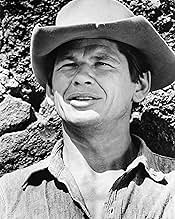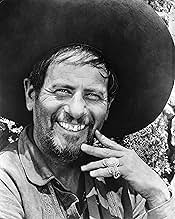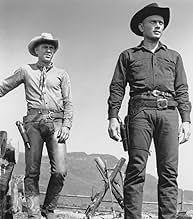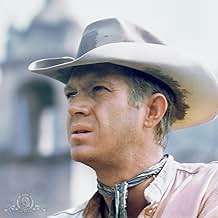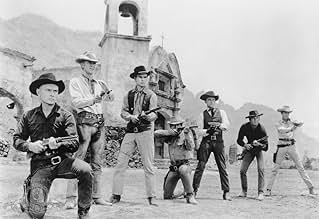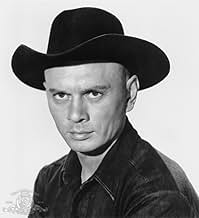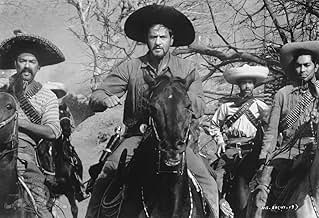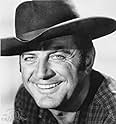Sete pistoleiros são contratados por mexicanos para libertar sua aldeia dos bandidos opressores.Sete pistoleiros são contratados por mexicanos para libertar sua aldeia dos bandidos opressores.Sete pistoleiros são contratados por mexicanos para libertar sua aldeia dos bandidos opressores.
- Direção
- Roteiristas
- Artistas
- Indicado a 1 Oscar
- 2 vitórias e 6 indicações no total
Jorge Martínez de Hoyos
- Hilario
- (as Jorge Martinez de Hoyas)
Natividad Vacío
- Villager
- (as Natividad Vacio)
John A. Alonzo
- Miguel
- (as John Alonso)
Resumo
Reviewers say 'The Magnificent Seven' has a strong cast, including Yul Brynner and Steve McQueen, and an iconic score. But it's seen as less profound and more formulaic than 'Seven Samurai', which it's a remake of. The Western setting and Hollywood production style differentiate it from the more culturally specific and artistically driven original.
Avaliações em destaque
I saw this film umpteenth number of times in the late 80s n early 90s on a VHS. Revisited it recently on a DVD after watching the remake (Denzel Washington one). Well this movie itself is a western remake of Kurosawa's Seven Samurai. As a fan of western films n being a big fan of Mcqueen, i enjoyed it more than Seven Samurai. The film is an engaging n adventurous western, awesomely directed by John Sturges. The story is simple, poor farmers hire seven gunslingers to protect them from a small army of bandits.
Yul Brynner is full of attitude n terrific as the leader of the seven. Steve McQueen really shines as the right-hand man. Charlie Bronson in his leanest physique wearing a stylish full sleeves tshirt n denim shirt. James Coburn is cool but very deadly with his knife than guns. His body language speaking louder than any of his lines. Robert Vaughn as the man who loves to live life king size n who's fightin his inner demons. Brad Dexter is the big muscular guy with a good sense of humour. And then there is Eli Wallach as the bandit leader. Watch out for Wallach's statement on generosity. The film has a lot of great scenes involving the action and shootouts that is engaging to watch. The Magnificent Seven is not complete without mentioning Elmer Bernstein's legendary score.
Yul Brynner is full of attitude n terrific as the leader of the seven. Steve McQueen really shines as the right-hand man. Charlie Bronson in his leanest physique wearing a stylish full sleeves tshirt n denim shirt. James Coburn is cool but very deadly with his knife than guns. His body language speaking louder than any of his lines. Robert Vaughn as the man who loves to live life king size n who's fightin his inner demons. Brad Dexter is the big muscular guy with a good sense of humour. And then there is Eli Wallach as the bandit leader. Watch out for Wallach's statement on generosity. The film has a lot of great scenes involving the action and shootouts that is engaging to watch. The Magnificent Seven is not complete without mentioning Elmer Bernstein's legendary score.
Based somewhat faithfully on the Akira Kurosawa classic Shichinin no samurai, The Magnificent Seven could be mistaken for just another of the many Westerns that were turned out in Hollywood during this era. But there is a certain something that keeps The Magnificent Seven unique. Part of it is the concept borrowed from the earlier Japanese film, but some of it lies in the attitude of the seven mercenaries referred to in the title.
Much is made here of the difference between fighting for money, fighting for justice, or fighting for a future. While this version of Kurosawa's epic contains all the philosophical leanings of the original, it isn't nearly as long-winded or languid. The downside to this is that it isn't nearly as moody or powerful. In fact, one can easily see the difference between American and foreign cinema simply by comparing Shichinin no samurai with The Magnificent Seven. One is incredibly dark and downbeat most of the time. The other mostly has a score that is so major it wouldn't sound out of place in Seven Brides For Seven Brothers.
Differences in feeling aside, the ultimate question is whether this version of the story manages to entertain. The hardest challenge any film faces is keeping the audience amused while all the exposition is laid out. Here, the exposition is kept to a minimum while carefully inserted between some fast-paced, albeit very mild action sequences.
Sometimes, the dialogue ("We deal in lead, friend.") gets incredibly stilted. Sometimes, it seems incredibly wise. Well, since we have examples of films where it's all stilted, all the time, we can forgive this one. The film also includes several textbook examples of how to include a sudden plot element without seeming contrived. When we learn why Calvera's men just won't go away, it needs no setup simply because it is consistent with their behaviour throughout the rest of the film.
In the end, The Magnificent Seven comes off as an excellent remake of a masterpiece. There are better Westerns out there, and there are better action films, but there aren't many. I gave it a nine out of ten. Go in expecting to be entertained, but little more, and you cannot go wrong.
Much is made here of the difference between fighting for money, fighting for justice, or fighting for a future. While this version of Kurosawa's epic contains all the philosophical leanings of the original, it isn't nearly as long-winded or languid. The downside to this is that it isn't nearly as moody or powerful. In fact, one can easily see the difference between American and foreign cinema simply by comparing Shichinin no samurai with The Magnificent Seven. One is incredibly dark and downbeat most of the time. The other mostly has a score that is so major it wouldn't sound out of place in Seven Brides For Seven Brothers.
Differences in feeling aside, the ultimate question is whether this version of the story manages to entertain. The hardest challenge any film faces is keeping the audience amused while all the exposition is laid out. Here, the exposition is kept to a minimum while carefully inserted between some fast-paced, albeit very mild action sequences.
Sometimes, the dialogue ("We deal in lead, friend.") gets incredibly stilted. Sometimes, it seems incredibly wise. Well, since we have examples of films where it's all stilted, all the time, we can forgive this one. The film also includes several textbook examples of how to include a sudden plot element without seeming contrived. When we learn why Calvera's men just won't go away, it needs no setup simply because it is consistent with their behaviour throughout the rest of the film.
In the end, The Magnificent Seven comes off as an excellent remake of a masterpiece. There are better Westerns out there, and there are better action films, but there aren't many. I gave it a nine out of ten. Go in expecting to be entertained, but little more, and you cannot go wrong.
Every year a Mexican bandit and his large gang of forty thieves harass and plunder a poor farming village south of the American border. They take what they need in provisions from the increasingly impoverished inhabitants. Deciding that enough means ENOUGH (and the wise old man in the village advises that it is DO or DIE), the village elders recruit gunmen from the US to defend them. The actual recruiting of six of the motley crew of gunslingers is done by top American gunman, the grim Chris Adams (Yul Brynner), dressed in black. The wages are only twenty dollars but chow is included, and it is good Mexican food (as the Americans discover). Each one of the defenders has his own reasons for volunteering, and not necessarily as a sense of doing the right thing (one of the men is a soldier of fortune). The men have various talents. For instance, one is a sharpshooter; another is handy with a knife. Much of the film is obviously a build-up to the final confrontation between the "good guys" and the banditos.
Outside of the rousing action-packed sequences, this movie has four merits: the actors, the cinematography, Elmer Bernstein's Oscar-nominated music score, and the on-location filming in Mexico. Stars and future stars like Yul Brynner, Charles Bronson, Steve Mc Queen, Robert Vaughn, and James Coburn do not disappoint. Eli Wallach, the future "Tuco," stars as an appropriate pitiless Mexican leader Calvera, who is not without his own concerns. Of course, with so many personalities, actors "battle" for screen time. There is an underlying message in this movie (and in subsequent remakes) that is overlooked: Mexico was a place of anarchy where the federal government could not always keep law and order.
John Sturges' western was lifted from Akira Kurosawa's "Seven Samurai" (1954), perhaps the greatest movie ever filmed in Japan. In this original version, seven unemployed samurai swordsmen are also hired to fight bandits who terrorize a village. But Kurosawa made a superior film showing the importance of the code of honor of the defenders along with their three-dimensional character development (the film's length was much longer). He even showed a sketch of the Japanese village and the name (or symbols) of each of the bad guys. So when one of them was bumped off, one of the samurai would cross off his name from the bandit list. This helps the audience understand the defensive strategy and what was happening in the battles as the number of the bandits diminished.
Nevertheless, "The Magnificent Seven" does stand on its own merits in the heyday of American westerns as a very good movie to enjoy. Even though the pacing is slow, it remains worthwhile watching.
Outside of the rousing action-packed sequences, this movie has four merits: the actors, the cinematography, Elmer Bernstein's Oscar-nominated music score, and the on-location filming in Mexico. Stars and future stars like Yul Brynner, Charles Bronson, Steve Mc Queen, Robert Vaughn, and James Coburn do not disappoint. Eli Wallach, the future "Tuco," stars as an appropriate pitiless Mexican leader Calvera, who is not without his own concerns. Of course, with so many personalities, actors "battle" for screen time. There is an underlying message in this movie (and in subsequent remakes) that is overlooked: Mexico was a place of anarchy where the federal government could not always keep law and order.
John Sturges' western was lifted from Akira Kurosawa's "Seven Samurai" (1954), perhaps the greatest movie ever filmed in Japan. In this original version, seven unemployed samurai swordsmen are also hired to fight bandits who terrorize a village. But Kurosawa made a superior film showing the importance of the code of honor of the defenders along with their three-dimensional character development (the film's length was much longer). He even showed a sketch of the Japanese village and the name (or symbols) of each of the bad guys. So when one of them was bumped off, one of the samurai would cross off his name from the bandit list. This helps the audience understand the defensive strategy and what was happening in the battles as the number of the bandits diminished.
Nevertheless, "The Magnificent Seven" does stand on its own merits in the heyday of American westerns as a very good movie to enjoy. Even though the pacing is slow, it remains worthwhile watching.
I've seen both the American and Japanese versions many times, and while everyone agrees about which one is better, the American version has some virtues: 1) Our heroes are selected by the farmers when they defend a dead Indian's right to be buried in the same place as white people; therefore they are seen as champions of social and racial equality by the farmers. 2) A magnificent villain played by Eli Wallach. 3) Charlie Bronson's relationship with the village boys. And some tremendous faults: 1) Combining the Young Student and Crazy Fool characters; some of the most poignant scenes in the Japanese version involved the interaction between these two. 2) Not filming the final battle in the rain. And of course many more of each. It's an interesting discussion. Both are great movies that shouldn't be missed. Remember that Kurosawa gave John Sturges a sword in appreciation after seeing his film.
I recently subjected "The Magnificent Seven" to just about the toughest test imaginable--I watched it just a few days after "Seven Samurai." And while I'm not going to pretend it's on par with Kurosawa's astounding masterpiece, I have to tip my hat to Hollywood on this one: it's good, DAMN good, among the best American Westerns.
The focus of the screenplay is more on post-Bogart-pre-Eastwood cool banter than the gradual, taciturn character development of "Seven Samurai," but that doesn't mean that the film doesn't have a heart. Considering it clocks in at barely over two hours (compared to the marathonic three and a half of "Samurai"), it actually does a fantastic and very economical job of fleshing out its memorable cast of characters.
One particularly wonderful scene that stuck in my memory from the first time I saw the film ten years ago is the one where Lee (Robert Vaughn), drunk in the middle of the night, confesses his frailties and fear to two of the farmers. The scene (along with the general story of these down-and-out heroes) was groundbreaking in that it began the deconstruction and deromanticization of the Western hero which would be brought to fruition in Sergio Leone's unparalleled spaghetti Westerns.
The star-studded cast wouldn't hold up doing Shakespeare, but they're ideal in this gunslinging, cool-talking tough-guy adventure. As if a lineup of heroes that included Yul Brynner, Steve McQueen, Charles Bronson, and James Coburn wasn't enough, Eli Wallach steals the show as the Mexican bandit chief, a worthy precursor to his classic role "The Good, the Bad, and the Ugly." If the screenplay has a major flaw, it's that his character isn't featured more.
The score is, of course, one of the all-time classics. And while not as alive visually as the Japanese film that inspired it or the Italian Westerns it influenced, it's still mighty fine to look at, and the gunfights don't disappoint.
The pieces add up to one of the great entertaining films of all time, which still manages to be moving and morally aware despite its Hollywoodization of Kurosawa's vision.
The focus of the screenplay is more on post-Bogart-pre-Eastwood cool banter than the gradual, taciturn character development of "Seven Samurai," but that doesn't mean that the film doesn't have a heart. Considering it clocks in at barely over two hours (compared to the marathonic three and a half of "Samurai"), it actually does a fantastic and very economical job of fleshing out its memorable cast of characters.
One particularly wonderful scene that stuck in my memory from the first time I saw the film ten years ago is the one where Lee (Robert Vaughn), drunk in the middle of the night, confesses his frailties and fear to two of the farmers. The scene (along with the general story of these down-and-out heroes) was groundbreaking in that it began the deconstruction and deromanticization of the Western hero which would be brought to fruition in Sergio Leone's unparalleled spaghetti Westerns.
The star-studded cast wouldn't hold up doing Shakespeare, but they're ideal in this gunslinging, cool-talking tough-guy adventure. As if a lineup of heroes that included Yul Brynner, Steve McQueen, Charles Bronson, and James Coburn wasn't enough, Eli Wallach steals the show as the Mexican bandit chief, a worthy precursor to his classic role "The Good, the Bad, and the Ugly." If the screenplay has a major flaw, it's that his character isn't featured more.
The score is, of course, one of the all-time classics. And while not as alive visually as the Japanese film that inspired it or the Italian Westerns it influenced, it's still mighty fine to look at, and the gunfights don't disappoint.
The pieces add up to one of the great entertaining films of all time, which still manages to be moving and morally aware despite its Hollywoodization of Kurosawa's vision.
Você sabia?
- CuriosidadesAlthough the film received mixed reviews, Akira Kurosawa was so impressed he sent John Sturges a ceremonial sword as a gift.
- Erros de gravaçãoSteve McQueen wears Levi's jeans with the famous red tab, which were not introduced until the 1930s.
- Citações
[Calvera has just captured the Seven]
Calvera: What I don't understand is why a man like you took the job in the first place, hmm? Why, huh?
Chris: I wonder myself.
Calvera: No, come on, come on, tell me why.
Vin: It's like a fellow I once knew in El Paso. One day, he just took all his clothes off and jumped in a mess of cactus. I asked him that same question, "Why?"
Calvera: And?
Vin: He said, "It seemed to be a good idea at the time."
- Cenas durante ou pós-créditosAnd Introducing Horst Buchholz
- Versões alternativasThe German theatrical release differs from the German VHS video in the scene where the magnificent seven have been taken by surprise and have to put down their weapons on the table. Chico is the last one and stands in enragement. In the theatrical version he then nevertheless unstraps his belt like the others. In the VHS video version Chris jumps at Chico just in that moment when he wants to pull the gun. Chris takes his gun and puts it on desk. Then Chico unstraps his belt.
- ConexõesFeatured in Precious Images (1986)
- Trilhas sonorasThe Magnificent Seven Theme
Written by Elmer Bernstein
Principais escolhas
Faça login para avaliar e ver a lista de recomendações personalizadas
- How long is The Magnificent Seven?Fornecido pela Alexa
Detalhes
- Data de lançamento
- País de origem
- Idiomas
- Também conhecido como
- Siete hombres y un destino
- Locações de filme
- Cuernavaca, Morelos, México(desert, sets)
- Empresas de produção
- Consulte mais créditos da empresa na IMDbPro
Bilheteria
- Orçamento
- US$ 2.000.000 (estimativa)
- Faturamento bruto mundial
- US$ 416
- Tempo de duração
- 2 h 8 min(128 min)
- Cor
- Mixagem de som
- Proporção
- 2.35 : 1
Contribua para esta página
Sugerir uma alteração ou adicionar conteúdo ausente


